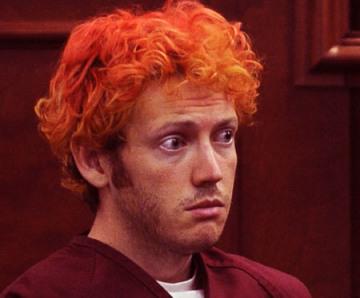
Image from infowars.com
According to a Nielsen report released in 2011, Americans spend 63.5 billion minutes per year social networking and blogging. Of the two hours that Americans spend using the Internet per day about one fourth of this time is on sites like Facebook and Twitter. These statistics are interesting considering the fact that James Holmes, accused of killing 12 people and wounding many others in a brutal shooting at a Colorado movie theatre on Friday, has virtually no social media presence. Today was Holmes’ first court appearance and many commented on his dazed, emotionless look. Some called him a “psychological, homicidal sociopath” who is “not a normal guy.” In an article entitled “Why did Colorado shooting suspect avoid social media?” CNN reports that the 24-year-old former graduate neuroscience student is an anomaly in his demographic, of which 81% uses social media. The author of the article, Doug Gross, quotes Dr. Pamela Rutledge, a psychology researcher as saying, “We could ask the same questions about the lack of Web presence that we could for anyone who isolates themselves. Was he socially isolated in all senses?… Social isolation can amplify the negative consequences of stress and increase the risk of developing psychopathology… What we don’t know is what caused Holmes to have such a break with reality.”
The article features statistics collected by the Pew Research Center’s Internet & American Life Project and quotes from its director, Lee Rainie, who says, “It’s not the norm for someone of this age to have such a limited presence… But it’s also a mistake to think everyone in this age cohort is living every minute of their lives with social media.” The author also quotes Dr. Tomas Chamorro-Premuzic, who teaches business psychology at University College in London: “He (possibly) did not want to have any reputation other than for what he was planning to do, like someone who saves himself for the big stage.” Further, the author contrasts Holmes with Jared Lee Loughner, who killed six and wounded congresswoman Gabrielle Giffords last year. He had a MySpace and YouTube account, saying things like, “In conclusion, reading the second United States constitution I can’t trust the current government because of the ratifications: the government is implying mind control and brainwash on the people by controlling grammar. No! I won’t pay debt with a currency that’s not backed by gold and silver! No! I won’t trust in God!” A person cannot be deemed mentally unstable just because of the nature of a crime he committed. In court, the accused’s state of mind before a crime must be analyzed to make an accurate judgment and prevent what is known as “acting.” The lack of information on Holmes is especially troubling, given that he was an honors student and doctoral candidate with no criminal record. Holmes used to be a counselor at a camp for children in need and is described as “clean-cut, quiet, responsible” by those who know him.
On the other hand, Doug Gross also explains that Seung-Hui Cho, who perpetrated the massacre at Virginia Tech five years ago, also had no online presence. So is there a correlation? Does the fact that Holmes avoided social media explain why he withdrew from graduate school, ordered weapons and 6,000 rounds of ammo four months in advance, booby-trapped his home and committed this awful crime wearing a gas mask, body armor and calling himself “The Joker?” Dr. JoAnne Cantor says that social media “meets our very basic need for a sense of belonging. Hearing from our friends and family makes us feel important and loved.” Julie Upton, R.D. says, “Using social media to follow [others] can help you change the ‘reality’ you may be living in… [It] can help inspire and instill new habits, feelings and behavior.” Susan Greenfield, a professor at Oxford Univeristy and director of the Royal Institution of Great Britain, questioned the perceived benefits of social networking in 2009: “Real conversation in real time may eventually give way to these sanitized and easier screen dialogues, in much the same way as killing, skinning and butchering an animal to eat has been replaced by the convenience of packages of meat on the supermarket shelf. Perhaps future generations will recoil with similar horror at the messiness, unpredictability and immediate personal involvement of a three-dimensional, real-time interaction.”
As Holmes’ sanity is questioned, it’s best for the court to analyze the information available instead of examining why social media data is missing. Given the public nature of social media postings and blogs, they should not be relied upon to determine a criminal’s motive. Crimes would not exist if they were not planned in secret, so criminals cannot be expected to disclose much through these outlets in the first place.
Sources:
http://www.cnn.com/2012/07/23/tech/social-media/colorado-suspect-social-media/index.html
http://www.cnn.com/2012/07/24/justice/colorado-shooting-holmes/index.html?hpt=hp_c1
http://www.cnn.com/2012/07/20/us/colorado-theater-suspect-profile/index.html?iid=article_sidebar
http://www.cnn.com/2011/CRIME/01/08/arizona.shootings.suspect.social/index.html
http://www.ivillage.com/10-ways-social-media-affects-your-mental-health/4-b-443353#443340
http://thelede.blogs.nytimes.com/2009/02/24/is-social-networking-killing-you/
http://linchikwok.blogspot.com/2011/01/how-much-time-do-americans-spend-on.html

